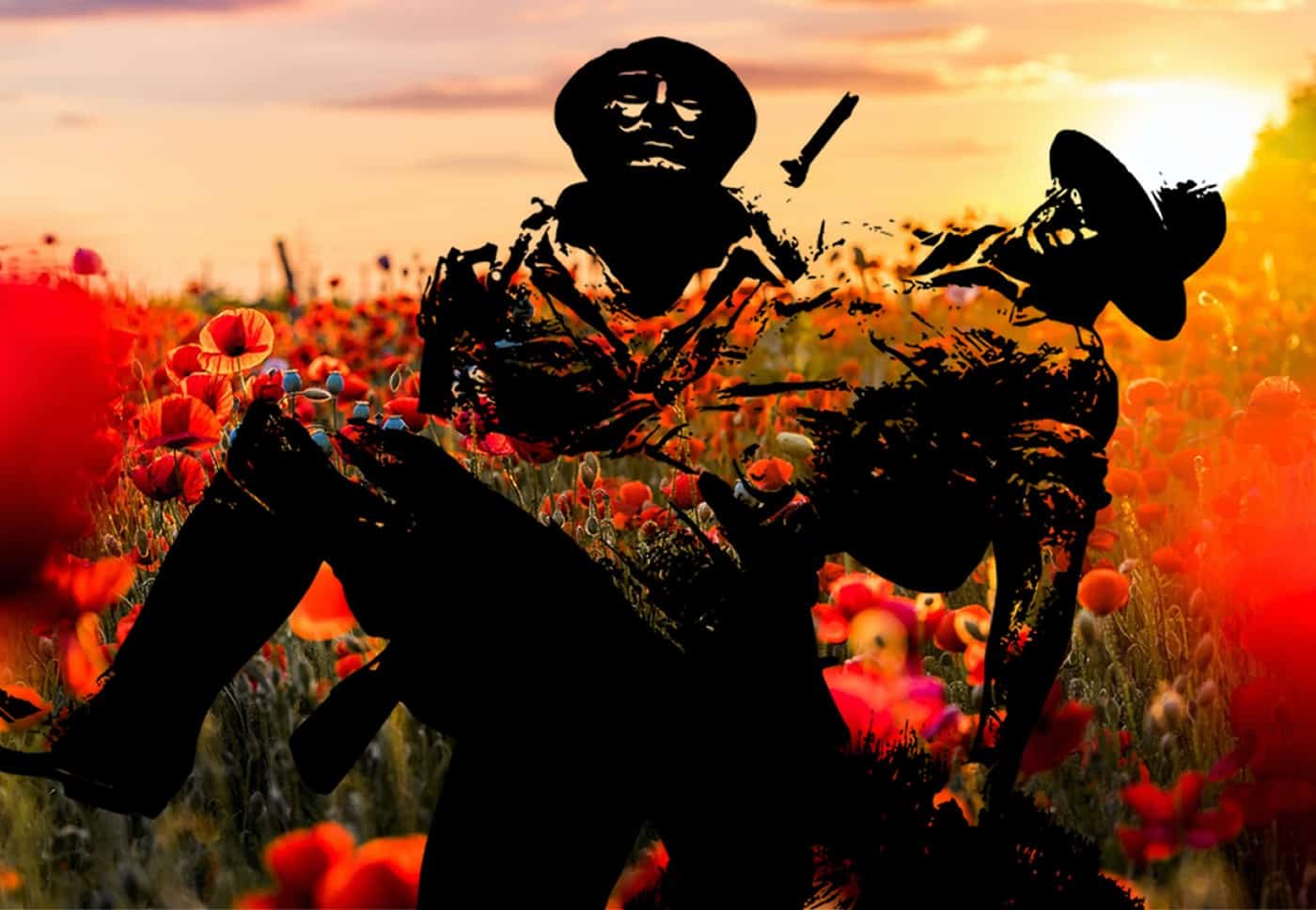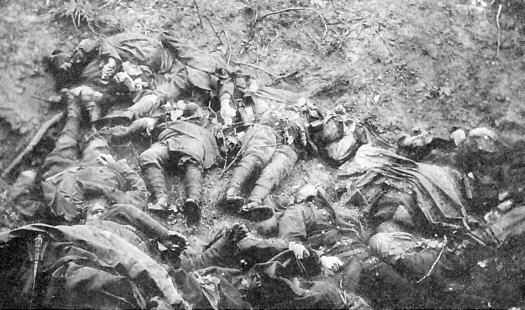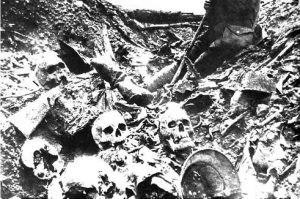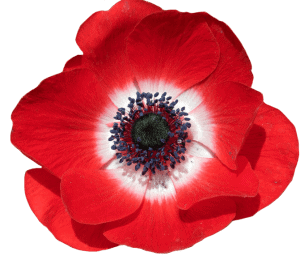Anzac Day 2011

Carnage incomparable, and human squander
On this Anzac Day:
If there is one thing that can be said of war it is that it is a massive betrayal of Humanity.
It is a monstrous failure of human imagination, vision, ingenuity and intelligence.
It is an unconscionably, and intentionally, blind refusal to allow any other possibility.
It is a willingness of the old and corrupt to inflict permanent damage on the young and innocent for the sake of what?
Impermanent, pathological and ugly ideology.
Whatever justifications and rationalisations may be made, war is the coward’s way.
War is the easy choice of the cheat, the sneak, the corrupt and the fake.
Or the delectable first choice of the bloodthirsty and the brutally mad.
All this can be said of the political “leaders” who lead their regiments from behind, who conduct their precious wars safely from behind a desk (under which they are probably fondling a small but hopeful erection) in a place far away from flying bullets.
It cannot be said of those whom we honour on this Anzac Day. For whatever other reasons they went to fight, they have also gone to fight to protect us and we are grateful. And we are sorry for the pain, the damage and the horror that they became because they could not forget. As we should not.
Peter Cundall has a new CD out and it’s not about gardening.
An iconic Australian unleashes the raw emotion of the world’s greatest war poetry. Australia’s beloved gardener shows a very different side as he reads anti-war poetry. With orchestral music accompanying the readings, this is a rare insight into ex-Gunner Peter Cundall’s life in war.
Here’s a taste. You can buy the CD anywhere, including ABC Shops. [Update: availability uncertain]
And here is the full Sassoon poem:
Aftermath – Siegfried Sassoon

Have you forgotten yet?…
For the world’s events have rumbled on since those gagged days,
Like traffic checked a while at the crossing of city ways:
And the haunted gap in your mind has filled with thoughts that flow
Like clouds in the lit heavens of life; and you’re a man reprieved to go,
Taking your peaceful share of Time, with joy to spare.
But the past is just the same,—and War’s a bloody game….
Have you forgotten yet?…
Look down, and swear by the slain of the War that you’ll never forget.
Do you remember the dark months you held the sector at Mametz,—
The nights you watched and wired and dug and piled sandbags on parapets?
Do you remember the rats; and the stench
Of corpses rotting in front of the front-line trench,—
And dawn coming, dirty-white, and chill with a hopeless rain?
Do you ever stop and ask, “Is it all going to happen again?”
Do you remember that hour of din before the attack,—
And the anger, the blind compassion that seized and shook you then
As you peered at the doomed and haggard faces of your men?
Do you remember the stretcher-cases lurching back
With dying eyes and lolling heads, those ashen-grey
Masks of the lads who once were keen and kind and gay?
Have you forgotten yet?…
Look up, and swear by the green of the Spring that you’ll never forget.
![]()
Here is Dylan Thomas reading of one of our favourite anti-war poems (if there could be such a thing):
Naming of Parts
Naming of Parts – Henry Reed
To-day we have naming of parts. Yesterday,
We had daily cleaning. And to-morrow morning,
We shall have what to do after firing. But to-day,
To-day we have naming of parts. Japonica
Glistens like coral in all of the neighboring gardens,
And to-day we have naming of parts.
This is the lower sling swivel. And this
Is the upper sling swivel, whose use you will see,
When you are given your slings. And this is the piling swivel,
Which in your case you have not got. The branches
Hold in the gardens their silent, eloquent gestures,
Which in our case we have not got.
This is the safety-catch, which is always released
With an easy flick of the thumb. And please do not let me
See anyone using his finger. You can do it quite easy
If you have any strength in your thumb. The blossoms
Are fragile and motionless, never letting anyone see
Any of them using their finger.
And this you can see is the bolt. The purpose of this
Is to open the breech, as you see. We can slide it
Rapidly backwards and forwards: we call this
Easing the spring. And rapidly backwards and forwards
The early bees are assaulting and fumbling the flowers:
They call it easing the Spring.
They call it easing the Spring: it is perfectly easy
If you have any strength in your thumb: like the bolt,
And the breech, and the cocking-piece, and the point of balance,
Which in our case we have not got; and the almond-blossom
Silent in all of the gardens and the bees going backwards and forwards,
For to-day we have naming of parts.
![]()
And this is perhaps the great Wilfred Owen’s most harrowing poem:
Mental Cases

Who are these? Why sit they here in twilight?
Wherefore rock they, purgatorial shadows,
Drooping tongues from jaws that slob their relish,
Baring teeth that leer like skulls’ tongues wicked?
Stroke on stroke of pain, – but what slow panic,
Gouged these chasms round their fretted sockets?
Ever from their hair and through their hand palms
Misery swelters. Surely we have perished
Sleeping, and walk hell; but who these hellish?
– These are men whose minds the Dead have ravished.
Memory fingers in their hair of murders,
Multitudinous murders they once witnessed.
Wading sloughs of flesh these helpless wander,
Treading blood from lungs that had loved laughter.
Always they must see these things and hear them,
Batter of guns and shatter of flying muscles,
Carnage incomparable, and human squander
Rucked too thick for these men’s extrication.
Therefore still their eyeballs shrink tormented
Back into their brains, because on their sense
Sunlight seems a bloodsmear; night comes blood-black;
Dawn breaks open like a wound that bleeds afresh.
– Thus their heads wear this hilarious, hideous,
Awful falseness of set-smiling corpses.
– Thus their hands are plucking at each other;
Picking at the rope-knouts of their scourging;
Snatching after us who smote them, brother,
Pawing us who dealt them war and madness.
![]()
Lest we forget fail to get the lessons of the pointlessness, the tragedy and the inhumanity of war.
Especially on Anzac Day.





0 Comments